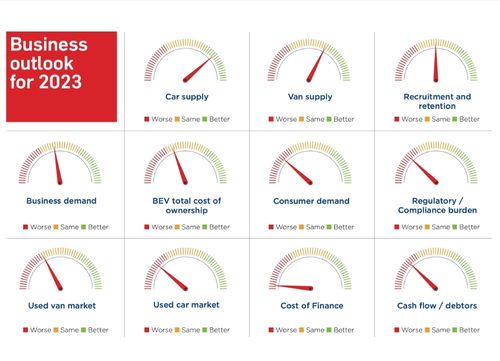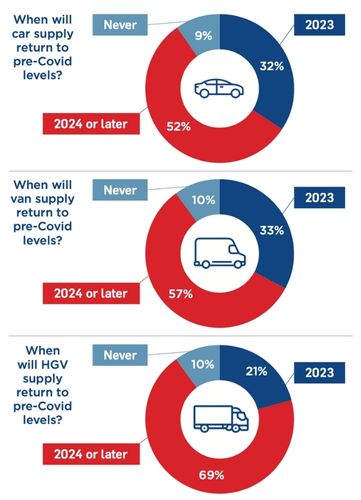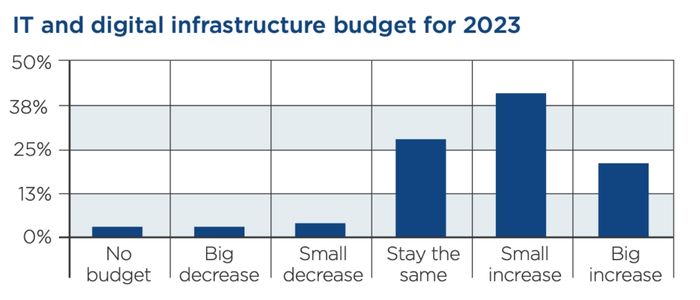
2022 brought challenges, but as a business and in the broader industry, we worked hard to minimise the impact on our customers.
Part of our ongoing efforts saw Guy Mason, Operations Director here at SG Fleet, contributed to the British Vehicle Renting and Leasing Association (BVRLA) industry outlook survey. We’re delighted to share the results with you.
The report is focused on helping you understand the market forces and business priorities that your sector is dealing with, supporting you in making more informed decisions going forward.
Let’s start by exploring the challenges raised by the report, as that will help us look into the impacts that the findings likely have on the industry.

Figure 1 Image Source BVRLA INDUSTRY OUTLOOK REPORT
The Cost of LivingThe BVRLA industry outlook reported that the impacts of the cost of living crisis are set to worsen for many. With the Office for National Statistics (ONS) predicting a 4.3% drop in real post-tax household income this year, the leasing and rental sector will likely continue to experience significant impacts. These are set to affect how businesses interact with customers and employees.
The obligation to treat customers fairly will be tested by the increased risk of defaults on rental payments due to declining incomes. In these situations, leasing companies are expected to offer forbearance and restructure payment profiles to support customers as much as possible.
As a result of the Covid-19 pandemic and global instability, commercial vehicles, including both light commercial vehicles(LCVs) and heavy goods vehicles (HGVs), are in desperately short supply, resulting in price rises of between 30-40%.
As shown on the graphic below, only 33% of LCV operators predict this crisis will return to pre-pandemic levels before 2024, with 57% estimating the situation will continue into next year. The overall consensus from the BVRLA industry outlook report was for a return to normal supply times appears to occur in the final quarter of 2023 at the earliest, with most of the coming year revolving around clearing the backlog of outstanding orders.

Figure 2 Image Source BVRLA INDUSTRY OUTLOOK REPORT
Linked with the extensive global supply issues are the questions around longer lead times and, more specifically, the impact this has on business outgoings. When asked, 58% of those at the BVRLA industry outlook survey said they resigned to the fact that longer lead times are standard throughout the industry. The result is that more than half of all rental companies are using older fleets to account for the delays in accessing new vehicles.
To combat this challenge, we launched a lead-in leasing option to provide our customers with quicker mobility solutions. This utilises used vehicles, which can be made available immediately to sidestep the long lead times currently impacting new vehicles.
We also pledge to ensure continued customer support and extend contracts informally to ensure that any extra costs caused by longer lead times do not affect our consumers.
Demand in the rental and leasing sectors has indeed remained high, with 43% of members predicting no decline in demand this year, while 28% expect an increase. However, while orders may remain high, 70% of members have highlighted pricing uncertainty as a significant cause for concern. In addition, with a rise in interest rates from 0.25% to 3% in less than a year, BVRLA members are facing the highest interest hikes over a decade.
These problems go beyond scale, however. The speed at which interest rates change means that leasing quotations are often rendered obsolete within 28 days giving suppliers an unenviable decision. They can either honour the quoted price, which no longer reflects the actual cost or pass on the higher costs to consumers or suppliers.
The rate and size of the increases could have a knock-on effect on customers as buying and leasing costs are likely to increase as a result. While operators will be keen to reduce these costs' impact on consumers, increased levels of customer flexibility may be a necessity going forward.
.jpg)
Figure 3 Image Source BVRLA INDUSTRY OUTLOOK REPORT
To combat the challenges predicted for 2023, rental and leasing companies are investing heavily in technology in administrative areas and the fleet itself. As the graphic below displays, operators plan to continue this investment throughout the coming year.

Figure 4 Image Source BVRLA INDUSTRY OUTLOOK REPORT
By increased levels of digitalisation in their back-office systems, companies will be able to operate larger fleets without increasing headcounts by utilising connected vehicle technologies that allow closer vehicle management.
Linked to this is a drive to exploit the data gathered from telemetric systems or the connected technologies in electric vehicles (EVs). 63% of leasing companies said they are seeking technological solutions to increase operational efficiencies, and investment in modern EVs will play a significant part in this.
Battery electric motors powered 33% of all new fleet additions in the leasing sector in Q3 of 2022, while plug-in hybrids accounted for a further 14%. This means that eco-focussed vehicles accounted for almost half of all new fleet additions in the leasing sector.
The increased connectivity of up-to-date EVs could also provide operators with a shortcut regarding managing charging costs. Rental and leasing businesses would be able to help their customers calculate a fair reimbursement rate for electric business miles.
In the last year, there has been a 20.5% increase in cars funded through salary sacrifice schemes. At 37,000 cars, the volumes may be modest, but the trajectory is hugely positive, resulting in leasing executives continuing to anticipate strong future growth.
The prominence of salary sacrifice plans will be highly beneficial to those looking to lease vehicles, as operators will likely continue to invest in salary sacrifice plans, allowing customers to access up-to-date vehicles at a low upfront cost.
The surge in EV usage is likely to be shored up by the Government continuing to offer a long-term view of benefit-in-kind tax. The tax rate has been extended to 2028 in steady increments that promise to provide support without creating a market shock.
Customers could see lower costs for EV leasing and salary sacrifice schemes as a result of this, as the benefit-in-kind tax approach is likely to allow providers to be more competitive with their pricing.
The report's findings may seem a little daunting at first, but with over 30 years of experience, SG Fleet can help you make the most of the coming year.
Not only do we provide market-leading, bespoke fleet services and employee car benefit solutions, but our extensive driver support and innovative fleet management approaches make us the ideal choice to support you in managing the challenges of 2023
To find out more, look at our services or get in touch for more details.
- How Our Commercial Vehicle Team Can Help You
- SG Fleet Wins Best Eco Initiative at The Business Car Awards 2022
- How Will Energy Prices Affect Fleet Costs?
- Keyless Technology: How It Could Change Fleet Driving
- SG Rental and Litelease: Which is Right For You?